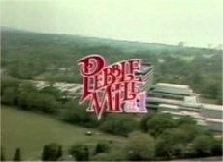
TV Pop Diaries
Pop Music on British Television 1955 -
Daytime television in Britain in the sixties and seventies was an existentialist wasteland that none but the most desperate or unwell would enter. The terrible, unwanted space was given over to school's programming and Welsh language shows with only ITV's forthcoming adverts feast Monday's Newcomers and made in colour trade films on BBC2 showing any inclination to entertain.
ATV had tried to lighten the ennui with Lunch Box, hosted by Noele Gordon. The show
ran from the mid fifties to early sixties and would feature items that would appeal
to housewives putting their feet up for an hour, but as soon as the signature tune
faded television would close down until the kids got in from school. The only thing
the BBC offered in return was Watch With Mother, and sometime later, Play School
suggesting the BBC would only see daytime TV suitable for mothers and their children.
Other ITV channels would offer short-
The BBC had opened its Midlands television and radio studios in 1971. Based at Pebble Mill in Edgbaston, Birmingham it would give the BBC extra space for drama and lifestyle programming, while its radio studio would now be the home for The Archers. It was in Pebble Mill's hands to make to make a cheap weekday lunchtime show, broadcast live after a fifteen minute news report. It would essentially be a remake of ATV's Lunch Box, but this time broadcast from the studio's foyer instead of valuable studio space.
Bob Langley, fresh from his residency co-
Hosts from regional TV looking to be seen nationally were recruited and the first show went on air in autumn 1972. It would never be a ratings winner and despite the well researched hosts it looked as cheap as it was. The studio audience didn't help matters either, largely made up of visitors from nursing homes. They would have looked happier and more alert if they were at the bingo. It was to the credit of hosts Donny MacLeod, Bob Langley and Marian Foster that they kept it together, where lesser talent would rebuke the dead from their slumber.
Soon after Pebble Mill's debut ITV responded with it's own news programme and Lunchtime With Wogan, also broadcast from Birmingham, suggesting that the Midlands was the cheaper place to broadcast from.
Pebble Mill At One and its weekend alternative Saturday Night At The Mill would have
chat, music, lifestyle items and the occasional location report. Although it was
reasonably well made the viewers couldn't help but feel like this was telly on a
budget, and a really small one at that. There would also be a talent show, Pebble
Mill Showcase in 1978, hosted by Norman Vaughan. 1978 also saw a BBC Records tie-
Despite its local community hall spirit the show was reaching four million people
by 1978. Show editor Terry Dobson told the Birmingham Evening Mail "We used to have
days when the figures fell away -
The music tended to be middle of the road, but they did play host to Sandy Denny in an early show, however it took until 1980 for things to perk up with some chart talent, albeit leftovers from the seventies. In 1982 Elvis Costello & The Attractions appeared, as did XTC performing Senses Working Overtime where Andy Partridge took a step backwards treading on some feminist art. Kate Bush, Elton John, The Kinks' Ray Davies and Status Quo would be interviewed by new recruit Paul Gambaccini. It was also in 1982 that the show celebrated its tenth anniversary show with guest Glen Campbell.
The show was pulled from the schedules in the mid eighties, but brought back in a
re-
There was, and still is, a pecking order for guests with the 'prime time' hours of 7 to 10 pm considered the best, followed by the new novelty of breakfast TV which could attract people you've actually heard of, then there would be a steep drop to shows like Pebble Mill. Even years later when television went 24 hours in the mid eighties appearing on daytime telly wouldn't be considered anything but a bit desperate. It was only when the Richard and Judy hosted This Morning debuted that daytime TV could finally justify itself and continues to do so to this day. It was ITV's sucker punch of This Morning, Lorraine Kelly and Loose Women that put Pebble Mill and shows like it to death. They were well produced, punchy, controversial sometimes, but more importantly, entertaining.
PEBBLE MILL AT ONE / PEBBLE MILL
BBC1 2nd October 1972 -
SATURDAY NIGHT AT THE MILL
BBC1 1976
